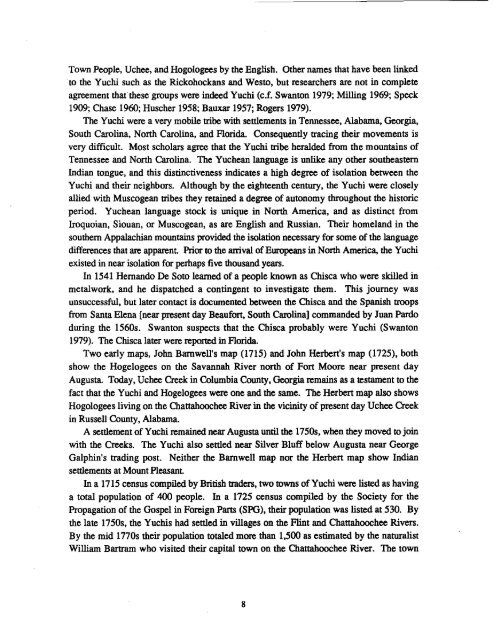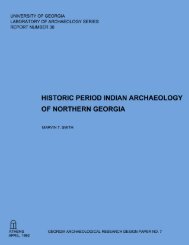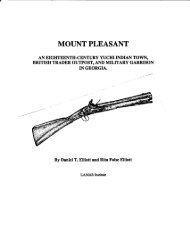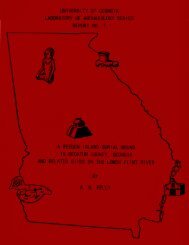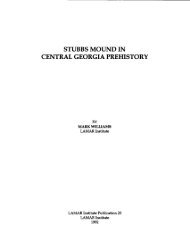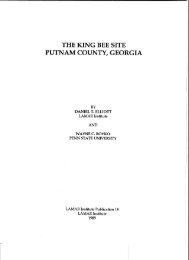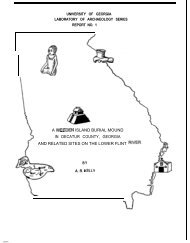Ye Pleasant Mount: 1989 1990 Excavations - Open site which ...
Ye Pleasant Mount: 1989 1990 Excavations - Open site which ...
Ye Pleasant Mount: 1989 1990 Excavations - Open site which ...
Create successful ePaper yourself
Turn your PDF publications into a flip-book with our unique Google optimized e-Paper software.
Town People, Uchee, and Hogologees by the English. Other names that have been linked<br />
to the Yuchi such as the Rickohockans and Westo, but researchers are not in complete<br />
agreement thatthese groups were indeed Yuchi (c.f. Swanton 1979; Milling 1969; Speck<br />
1909; Chase 1960; Huscher 1958; Bauxar 1957; Rogers 1979).<br />
The Yuchi were a very mobile tribe with settlements in Tennessee, Alabama, Georgia,<br />
South Carolina, North Carolina, and Florida. Consequently tracing their movements is<br />
very difficult. Most scholars agree that the Yuchi tribe heralded from the mountains of<br />
Tennessee and North Carolina. The Yuchean language is unlike any other southeastern<br />
Indian tongue, and this distinctiveness indicates a high degree of isolation between the<br />
Yuchi and their neighbors. Although by the eighteenth century, the Yuchi were closely<br />
allied with Muscogean tribes they retained a degree of autonomy throughout the historic<br />
period. Yuchean language stock is unique in North America, and as distinct from<br />
Iroquoian, Siouan, or Muscogean, as are English and Russian. Their homeland in the<br />
southern Appalachian mountains provided the isolation necessary for some ofthe language<br />
differences that are apparent Prior to the arrival ofEuropeans in North America, the Yuchi<br />
existed in near isolation for perhaps five thousand years.<br />
In 1541 Hernando De Soto learned of a people known as Chisca who were skilled in<br />
metalwork, and he dispatched a contingent to investigate them. This journey was<br />
unsuccessful, but later contact is documented between the Chisca and the Spanish troops<br />
from Santa Elena [near present day Beaufort, South Carolina] commanded by Juan Pardo<br />
during the 1560s. Swanton suspects that the Chisca probably were Yuchi (Swanton<br />
1979). The Chisca later were reported in Florida.<br />
Two early maps, John Barnwell's map (1715) and John Herbert's map (1725), both<br />
show the Hogelogees on the Savannah River north of Fort Moore near present day<br />
Augusta. Today, Uchee Creek in Columbia County, Georgia remains as a testament to the<br />
fact that the Yuchi and Hogelogees were one and the same. The Herbert map also shows<br />
Hogologees living on the Chattahoochee River in the vicinity ofpresent day Uchee Creek<br />
in Russell County, Alabama.<br />
A settlement ofYuchi remained near Augusta until the 17508, when they moved to join<br />
with the Creeks. The Yuchi also settled near Silver Bluff below Augusta near George<br />
Galphin's trading post. Neither the Barnwell map nor the Herbert map show Indian<br />
settlements at <strong>Mount</strong> <strong>Pleasant</strong><br />
In a 1715 census compiled by British traders, two towns ofYuchi were listed as having<br />
a total population of 400 people. In a 1725 census compiled by the Society for the<br />
Propagation of the Gospel in Foreign Parts (SPG), their population was listed at 530. By<br />
the late 1750s, the Yuchis had settled in villages on the Flint and Chattahoochee Rivers.<br />
By the mid 1770s their population totaled more than 1,500 as estimated by the naturalist<br />
William Bartram who vi<strong>site</strong>d their capital town on the Chattahoochee River. The town<br />
8


